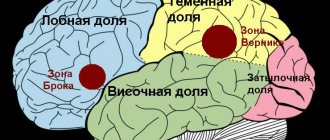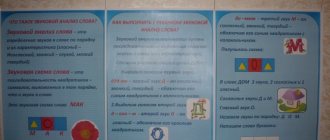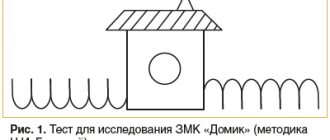Home — About speech therapy — Dyslexia specific reading disorders
Speaking of dyslexia. We mean conditions that are based on a persistent selective inability to master reading skills, despite a sufficient level of intellectual and speech development.
The core disorder in this case is a persistent inability to master syllable fusion and automated reading of whole words, which is often accompanied by a lack of understanding of what is read.
A child suffering from dyslexia, in addition to the above main disorder, has
- Phenomena of emotional-volitional immaturity;
- Has problems with the perception of written/printed information due to disruption of the processes of deployment, sequencing and switching. Doesn't recognize the words, can't understand what exactly he just read.
- Has difficulty developing writing skills, problems with spelling and spelling.
- Disorders of the central nervous system, manifested in behavioral disorders.
- Specific disorders of memory and attention.
Causes of dyslexia
Numerous studies have established that one of the causes of dyslexia is congenital lesions of the central nervous system, including disturbances of activity and attention (hyperactive children), as well as MMD (Minimal Brain Dysfunction).
The next reason is mental retardation (mental retardation).
A very important causal factor is disturbances in the occipital lobe (responsible for organizing complex processes of visual perception) and parietal lobe (responsible for organizing purposeful movements).
Another reason is General underdevelopment of speech (Motor alalia).
And finally, congenital brain pathology. But with it there is a nonspecific reading disorder.
Historical chronicle
The first suggestion about a special disorder - dyslexia - was made in 1887 by the German ophthalmologist Berlin. Nine years later, a sensational publication “Congenital word blindness” appeared in one of the English publications.
Its author, therapist Morgan, described a unique mental disorder that was manifested by the lack of fluent reading skills in a 14-year-old teenager who excelled in mathematics.
The medical community explained this phenomenon as the result of a defect in visual perception. In 1925, the American neuropsychologist Orton associated dyslexia with a disorder in the interaction of the cerebral hemispheres.
In the 70s of the 20th century, the culprit of word blindness was declared to be a deviation in phonological development, that is, the ability to distinguish sounds. This version finds the largest number of supporters in the modern scientific world.
Symptoms of dyslexia
Like other diseases, dyslexia has a number of characteristic signs, in the presence of which parents should pay special attention and begin to correct the existing disorder.
Be careful if:
- When reading, the child squints slightly, blinks frequently, and rubs his eyes;
- When reading, he brings the text too close to his eyes, closes one eye or turns his head so that one eye does not participate in reading;
- While reading, skips words or even paragraphs;
- While reading or after it, he complains of severe headache and fatigue;
- When writing, lines and words overlap each other, illegible handwriting, often writes words “back to front”;
- Confuses basic geometric shapes - does not remember them, does not identify them.
However, please note that these phenomena may be signs of decreased vision in the baby. Therefore, before contacting a specialist to correct dyslexia, it is necessary to undergo an ophthalmological examination and confirm the absence of vision problems.
Difficulties in learning to read and write. Neuropsychological perspective
Semenova O.A.
Difficulties in learning to read and write are one of the most common reasons for contacting a pediatric neuropsychologist. Usually, difficulties of this kind arise already in elementary school and, alas, drag all other subjects along with them. If you cannot correctly read the text of a paragraph or task, you are unlikely to be able to understand it; if you did not understand, you could not remember; if you did not remember, you could not apply the information contained in this text for educational purposes. If you cannot write down information correctly, you simply lose it, because writing is a way of recording knowledge.
To denote persistent difficulties in learning to read and write in medicine, pedagogy, defectology and psychology, the terms “dyslexia” and “dysgraphia” are often used. Dyslexia is characterized by a lack of reading technique (a person cannot learn to read quickly and without errors) and difficulties in understanding what is read, despite a normal level of intellectual development. The incidence of this disorder is equated to 5-17% in the population. Dysgraphia is characterized by a low level of mastery of writing skills in relation to the level that could be expected at the appropriate age, with appropriate intellectual abilities and in conditions of appropriate training.
In everyday understanding, difficulties in reading and writing are when a child constantly brings home “twos” and “threes” and cannot improve his result in any way.
But are reading and writing difficulties the same disorders? In neuropsychology, reading and writing are considered complex activities that require the participation of a number of mental processes for their correct implementation (see Table).
| Mental processes | Reading impairment due to their insufficiency | Violation of writing due to their insufficiency |
| Motivation | no motivation - no desire to learn to read | no motivation - no desire to learn to write |
| Intelligent Performance | if a child gets tired quickly when reading, it is difficult for him to learn to do it well, and this activity becomes a burden to him | if a child gets tired quickly when writing, it is difficult for him to learn to do it well, and this activity becomes a burden to him |
| Attention and voluntary regulation of activity | Typical reading difficulties that arise from attention deficit: guessing reading, losing a line, skipping words, retelling difficulties associated with the inability to consistently organize your thoughts | typical writing difficulties that arise from attention deficit: omission of letters, syllables, words when writing, errors in applying writing rules, spelling words together or, conversely, breaks in words, agrammatism (“mine went”), extra letters, word substitutions close in meaning (hare - wolf), geometrically inconsistent handwriting |
| Hearing | if hearing is impaired, reading will be impaired again due to underdevelopment of speech | If your hearing is impaired, it will be impossible to take dictation |
| Distinguishing by ear the meaning-forming characteristics of speech sounds (phonemic hearing) | reading may not suffer | A typical mistake when phonemic hearing is impaired will be sound replacement of both vowels and oppositional consonants (b-p, d-t, and so on), as well as replacement of words with similar sounds (guest-bone, for example). |
| Auditory-verbal memory | may have difficulty understanding what is read if it is not retained in memory | Difficulties in writing from dictation may arise in the form of loss of words, parts of a sentence, or replacement of words with similar meanings (stream - river, apple trees - roses). |
| Vision | reading letters and words requires good visual acuity | writing requires good visual acuity |
| Visual analysis/synthesis | if it is violated, the correct image of the letter may not be formed, letters that are similar in appearance will be confused, and the process of deciphering visual images will be difficult and slowed down. | Due to the insufficient formation of the visual image of the letter, when writing, replacements of letters that are similar in appearance occur. |
| Visual memory | letters are not remembered, the image of the word is not consolidated, which affects the speed and quality of reading | errors in recalling the spelling of letters, dictionary words (where the spelling cannot be checked) |
| Spatial representations | errors in reading backwards, replacing letters according to spatial characteristics (e-h, b-d) | substitution of letters according to spatial characteristics (b-d), specularity (“s”, for example, is written in the wrong direction), combined spelling of words with prepositions of spatial relation, difficulties in orientation in the space of a sheet |
| Synthesis of different types of perception | difficulties in translating a visual image into an auditory and articulatory one | difficulties in translating an auditory image into a visual one, and a visual image into a motor image (graphic) |
| Motor functions (oculomotor, speech motor, fine hand motor skills) | if oculomotor functions are impaired, then difficulties may arise in tracing the line, double letters | difficulties in following a line (with oculomotor difficulties), replacing letters by articulatory type (g-x, ts-ch, r-l, etc.) (with speech motor difficulties), difficulties in fast, beautiful, continuous writing, incorrect grip of the pen ( for disorders of fine motor skills). |
The above list does not pretend to be absolutely complete, but gives an idea of how diverse the causes of reading and writing disorders can be. Therefore, one of the first tasks facing a specialist who is approached about difficulties in learning to read or write is to determine the immediate causes leading to the occurrence of these difficulties. A neuropsychological examination is ideally suited for these purposes.
A neuropsychological examination is a system of tasks (tests, samples), each of which represents a cognitive activity, the implementation of which particularly requires the participation of some, and to a lesser extent, other mental functions. For example, in one of the neuropsychological tasks, the child is asked to remember several words presented to him by ear. Such a task requires, first of all, the participation of auditory perception (you need to hear these words correctly) and auditory-verbal memory (you need to try to retain what you heard in your memory). To a lesser extent, the participation of attention and voluntary regulation of activity is required here (although it is still required) and the participation of visual functions is practically not required at all (although some people resort to visual associations, memorizing something by ear). Thus, the task of memorizing a group of words makes it possible to assess auditory perception and auditory-verbal memory to a greater extent.
A neuropsychological examination allows us to determine the immediate causes of reading and writing impairment, namely, which cognitive functions are not well formed and affect the acquisition of these skills. After identifying the immediate causes, the neuropsychologist forms a plan for correcting these difficulties, focusing on the child’s level of development and those resources that can serve as a support for correction. Correction may include tasks that allow the child to directly develop underdeveloped cognitive functions. Also, correction may contain methods that teach the child how to circumvent the existing violation, if nothing can be done directly with this violation.
In subsequent materials, we will try to consider certain types of deficits in cognitive functions that lead to difficulties in learning to write and read, and propose tasks that can help a child correct these difficulties.
This time we will touch on only one of the topics: motivating a child to learn to read and write. Do you think a child who is just starting to learn to read and write has any idea why he needs this? Why might a child want to learn to read and write? These are very important questions that concern not only writing and reading, but also all types of activities that not only children, but also adults have to learn. Would you be willing to study something without knowing why? What kind of motivations can there be for learning? It is difficult to imagine that a child will learn to read and write because he cannot survive without it. One can imagine that a child would do this out of fear of being punished. There are parents who pose the question exactly this way. However, in the long term this does not lead to the development of a true interest in reading and writing, and in general it may end with the child perceiving study in general as something that can only be done under pressure. Once he becomes large and physically strong enough, he will be impossible to control. Some children read and write because they want to be good for mom, dad, or teacher. These are, as a rule, obedient children who will do something without even understanding why they need it, but simply because they were told “they have to.” Sometimes the desire to please a teacher or please your mother later develops into a love of reading and writing. But, if there are other ways to please, it is not a fact that the child will choose this one. Another option is the influence of public opinion on the child, the desire to be no worse than others. Children who have developed ambitions will try to read and write if this can somehow elevate them above others or, at least, make them no worse than others. This is possible only in conditions where active reading and writing are encouraged by adults who are authoritative for an ambitious child, and when the child does not have difficulties that impede the formation of these skills. In the latter case, behavior may begin to develop according to a protest scenario (“You want me to read and write well, but I won’t!”). And finally, the most adequate and rarest motivation in modern times is when a child learns to read or write simply because he is interested in it! Here is what Soviet psychologist Evgeniy Shuleshko wrote about the process of learning to read and write:
The ideal of writers is to express their speech in handwritten form. The ideal of readers is to recognize the familiar in the unfamiliar, to experience new and unusual feelings. Literacy classes should foster these ideals.
From this short quote, only one thing follows - a child will want to read and write only if he really needs it in order to express himself, or in order to gain new interesting experiences. Can he understand that writing and reading are really necessary if the adults close to him do not pick up a pen and book? The modern cultural environment accustoms the child to the fact that a computer keyboard and a television exist for the same purposes.
One of my acquaintances, a father with many children, taught his children to read in the following way: he showed them educational films in English with Russian subtitles. At some point, the children began to want to know more about what was happening in the film. Then the father said: “Let us stop the picture and read what is written there.” His children were motivated to learn to read. And this motivation was interest. Now his nine-year-old son has already read “Treasure Island” and is mastering “Robinson Crusoe.” And to spark an interest in writing, you can introduce notes to each other or emails into everyday life. By the way, a letter to Santa Claus for the New Year and greeting cards to dad and mom on their birthday are also an important element in the ritual of teaching a preschool child to write. Another very interesting and motivating game for reading is “Find the Surprise.” Mom or dad writes a note to the child: “Go to the bedroom, crawl under the bed. There you will find the following note." Under the bed the child discovers a new search guide, and so on. At the end of the journey (for example, in the oven) - a kinder surprise or something else, but equally pleasant. At first, the notes should be very simple, consisting of two short sentences. Gradually, the volume of the text and its complexity can be increased by providing the instructions with various prepositions of spatial relations (“Under the bed you will find a shoebox. Take out an envelope from under it. Inside the envelope, on blue paper, are your further actions”). This way you can develop not only reading skills, but also the child’s attention.
In the first stages of learning to write and read, it is always important to awaken in the child an interest in these types of activities, then they will be given without much emotional stress.
What can prevent a child from becoming motivated to learn to read and write? If the learning process tires the child very much. If his head, eyes or hands hurt from this. If, due to mistakes or a child’s misunderstanding of the tasks assigned to him, conflicts often arise. If a child is punished for mistakes. If they demand from him what is impossible for him, citing other children and adults as an example. If they offend him, they call him all sorts of unpleasant words when he cannot read or write correctly. When they don’t notice his efforts, but only pay attention to his mistakes. If you constantly give bad grades. When texts to read and write are long and boring.
Positive motivation is very important for a child to decide to follow this long and difficult path - the path of mastering reading and writing. Only patient and loving adults can help him with this. If, despite all the efforts of adults, a child resists reading and writing, you need to think about whether there are any obstacles to his health. To do this, it is important to consult with a neurologist, neuropsychologist and at least do a study of cerebral circulation, since very often behind learning difficulties there are purely medical reasons that weaken the child’s ability to withstand mental stress.
Diagnosis of dyslexia
- It is necessary to identify dyslexia in a child as early as possible. Moreover, as a rule, most parents do not suspect the presence of this problem until the child begins to learn letters in school or kindergarten. Therefore, it is recommended for preventive purposes to examine all children suffering from active and passive speech delay.
- The most important thing is to perform an EEG of the brain
- It is necessary to check the baby's visual acuity and hearing.
- An important component of diagnosis is a thorough medical and psychological examination, with the help of which it is possible to determine the presence of neurological disorders in order to certainly exclude other diseases “masquerading” as dyslexia and to choose the form of education that is preferable for the child in the future.
Classification of dysgraphic errors
Errors caused by immaturity of phonemic processes and auditory perception:
- missing vowels; all-hanging, room-room, harvest-harvest;
- omissions of consonants: komata-room, wey-all;
- omissions of syllables and parts of words: arrow lines;
- replacement of vowels: food-food, sesen-pine, light-light;
- replacement of consonants: tva-two, rocha-grove, harvest-harvest, bokazyvaed-shows;
- permutations of letters and syllables: onko-window;
- underwriting of letters and syllables: through-through, on a branch-on branches, dictation-dictation;
- building up words with extra letters and syllables: children-children, snow-snow, dictation-dictation;
- distortion of the word: malni-small, teapot-thicket;
- continuous spelling of words and their arbitrary division: two-two, strike-clock-strike, in all-all;
- inability to determine the boundaries of a sentence in a text, writing sentences together: Snow covered the entire earth. White carpet. The river is frozen and the birds are hungry. — Snow covered the whole earth with a white carpet. The river froze. The birds are hungry.
- violation of mitigation of consonants: big-big, just-only, sped off-rushed off, mach-ball.
Errors caused by unformed lexical and grammatical aspects of speech:
- violations of word agreement: from a spruce branch - from a spruce branch, grass appeared - grass appeared, huge butterflies - huge butterflies;
- violations of control: in the branch - from the branch; rushed to the thicket, rushed into the thicket, sitting on a chair, sitting on a chair;
- replacing words based on sound similarity;
- continuous writing of prepositions and separate writing of prefixes: grosche - in the grove, wall - on the wall, on the booze - swell;
- missing words in a sentence.
Errors caused by unformed visual recognition, analysis and synthesis, spatial perception:
- replacement of letters that differ in different positions in space: w-t, d-v, d-b;
- replacement of letters that differ in different numbers of identical elements: i-sh, ts-sch;
- replacing letters that have additional elements: i-ts, sh-shch, p-t, x-zh, l-m;
- mirror writing of letters
- omissions, extra or incorrectly positioned letter elements.
Errors caused by children’s inability to assimilate a large amount of educational material, remember and use orally learned spelling rules in writing:
- unstressed vowel at the root of the word: vada-water, chisy-hours;
- spelling of voiced and unvoiced sounds in the middle and at the end of a word: tooth-tooth, doroshka-path;
- denotation of softening of consonants;
- capital letter at the beginning of a sentence, in proper names.
Recently, another group of errors has been identified, which are considered necessary to be classified as dysgraphic if they are persistent. They say about children who have this type of error: “As they hear, so they write.” The classification of errors is based on the reasons for their occurrence. This will help the teacher (parent) both to identify the causes of difficulties and to correctly identify the type of violations in the writing process and plan work to overcome these violations.
Dyslexia correction
Dyslexia is treated with the help of special educational programs designed to help the child fill existing gaps in reading skills using special techniques taking into account the type of impairment. It is unacceptable to hope that dyslexia will go away “on its own” as the child grows up.
In any case, it should be remembered that dyslexia is not a death sentence. Children suffering from dyslexia can become artists in the future - like Leonardo da Vinci or Walt Disney, actors - like Dustin Hoffman or Quentin Tarantino, scientists - like Albert Einstein, and even writers - like Vladimir Mayakovsky or Hans Christian Andersen! All these great people also once suffered from dyslexia, but managed to solve their problem, and as a result achieved the highest results in their field.
Share:
Find out more about the Center's services and sign up for a consultation or lesson
You can call (812)
640-90-77
, or by filling out the form below.







